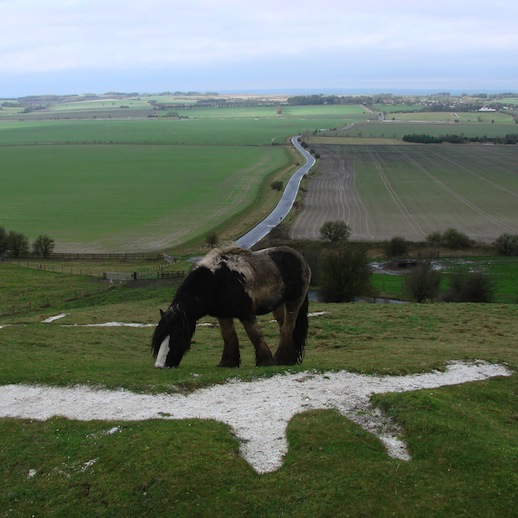Way Through – Clapper is Still (Upset the Rhythm LP, out 11 November)
Review by Rob St. John.
Way Through is the ‘pastoral punk’ band formed by Claire Titley and Chris Tipton, Shropshire natives who now live in London, running the highly successful DIY record label Upset the Rhythm. Clapper is Still follows 2010’s Arrow Shower, a fervent exploration of their Salopian roots, and a 2013 residency at Tate Britain. Clapper is Still is built on inquisitiveness and intelligence: sharp shards of guitar and peals of clattering drums become archaeological tools to unearth and reshape sights, sites and sounds from across England. Chris and Claire’s year’s field research for the LP can be explored through the band’s Google Map.
Underlying stories of rites and ruin are excavated and given new life by the off-kilter interplay of Chris and Claire’s vocals. Lyrics cribbed from local history leaflets, information boards and bus stop graffiti become spoken and sung invocations of the sublime, the suburban and the specific. Chiming, often-dissonant guitar gusts off into post-punk angles: plotting new cartographical soundings over old ground. There’s echoes here of the ghostly trad-punk of Una Baines’ group The Fates and of The Raincoats’ disintegrating, euphoric clatters and drones. On ‘Westonzoyland’, Claire’s narrated tale of the last battle to be fought on the Somerset Levels (now shining with black plastic bales of silage), freeform sweeps of fiddle dip over mistepping loops, finding some sonic resonance with Daniel Patrick Quinn’s wry surveys of the high upland north.
On ‘Dedham Vale’, rolling electric drones evoke the titular water meadows on the Essex-Suffolk border, washed in glowing hues by John Constable, and the circular ebb of a sample of Shirley and Dolly Collins’ take on the traditional song ‘Just as the Tide Was Flowing’. Just as the River Stour hoops towards the sea, becoming increasingly brackish, muddied and muddled at Dedham Vale, these fractured samples of sound and tradition are the bedload picked up and reshaped by Clapper is Still, the sediment accumulated and remade in the slack ebb of the margins.
‘Roughing Linn’s’ looping, lysergic smears of guitar wheel in and out of focus as scree-sharp drums alternatively groove and gallop underneath. The Roughing Linn is a sandstone outcrop in Northumberland, cut through by a hidden waterfall and with a surface striated by Prehistoric carvings. Out of sight of tourist routes and seemingly celebrated only by rock art aficionados and modern antiquarians, ‘Roughing Linn’ illustrates Way Through at their best: a keen, exploratory eye for a story told through euphoric song.
‘Haxey’ is perhaps as close as Way Through get to 1970s folk-rock revival: a jaunty riff underlain with strains of field recorded revelry, singing ‘this land is yours, for acting like a lord’. Each year on the Twelfth Day of Christmas (usually 6th January), a mass of people gather in the centre of the village of Haxey in Lincolnshire to drink, sing folk songs and finally gather in a scrum (or ‘sway’) of people to try and push the Haxey Hood – a leather tube – into one of four village pubs, where it then remains until the next year. The rite pitches celebration and tradition outside the Co-Op, up and over bus stops and traffic islands, occasionally moving cars like an untamed flood down the high street.
In his 1995 book, The Village That Died For England, Patrick Wright tells of Tyneham, a village on Dorset’s Jurassic Coast, was taken over by the War Office in winter 1943 for use as a military firing range. Wright writes of Mary Butts, the modernist writer of the 1920s and 1930s (and former pupil of Aleister Crowley), whose later work focused on what she termed the ‘Hollow Land’ of Tyneham and surrounds. This pre-evacuation work, inspired by William Morris’ similarly named 1856 story of the Hollow Land, a supernatural realm of limbo which once encountered can only be partially remembered, places Tyneham between the past(oral) and the present, and was prescient of the change to come.
On ‘Imber and Tyneham’, Way Through summon this history over propeller-wheels of drums and artillery bursts of prickling guitar, eventually overwhelmed by the layered peal of recorded church bells. The displaced 252 inhabitants of Tyneham (one of whom left a note on the church door saying ‘Please treat the church and houses with care; we have given up our homes where many of us lived for generations to help win the war to keep men free. We shall return one day and thank you for treating the village kindly’) were never to return. Tyneham now sits in a state of irresolution, where wildflowers untrammelled by modern agriculture found niches and flourished amongst the firing range’s disturbance regime, where shells periodically turned new hollows into the soil.
At Tyneham, this state of life overlaying ruin is refracted through a prism of English heritage (or more likely, English Heritage), the remaining preserved buildings are now museums and period film sets (most notably for Comrades, Bill Douglas’ spectral 1986 retelling of the Tolpuddle Martyrs story). It’s these tensions that Clapper is Still evokes so well: between stasis and change; tradition, modernity and uncertain memory and; most often, representations of the blurred, interesting places in between.
Clapper is Still is an ecstatic survey of England: clattering and chopped music of concrete, crops, rosettes and rituals. There’s an uncanny sense of tradition through this record, not necessarily in the touchstones of Shirley and Dolly, nor in the imagined nostalgia for a past frequently conjured by hauntological explorers of the landscape. Instead, in a modern, lived tradition of rural rites of passage and wide-eyed explorations of the English countryside: of ruined villages, fallow fields, pylons and flyovers; of cobbled drum kits and photocopied posters for gigs in village halls, an often unknowing participation in some far-away DIY culture. The spaces Way Through map aren’t mythologised, instead brought (back) to life with a potent sense of implicit understanding, a raucous, intelligent picture of the English landscape.
